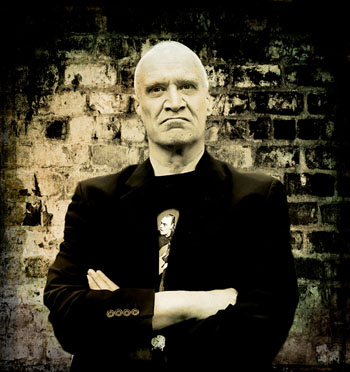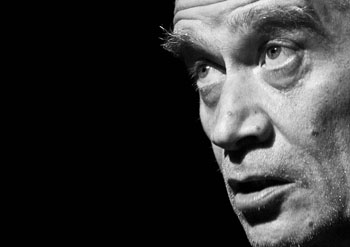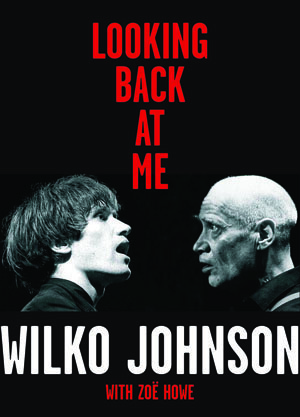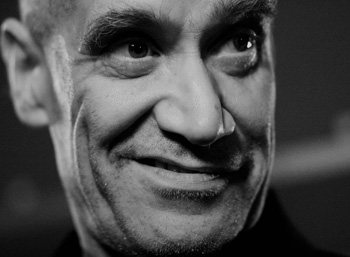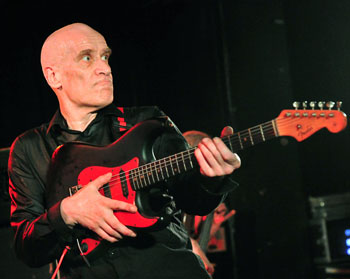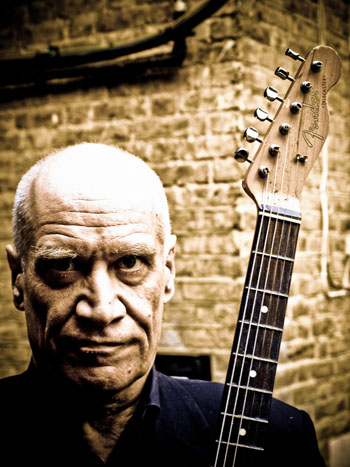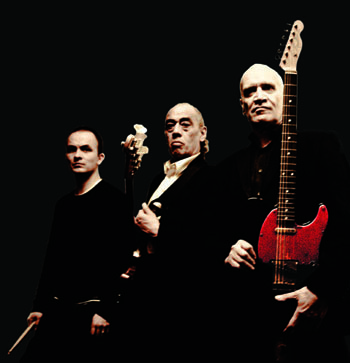
|
||
|
| Interview: WILKO JOHNSON |
With his brand new book 'Looking Back At Me' casting its wistful eye on a colourful career that is also explored in the recent Julian Temple DVD 'Oil City Confidential' and with the recently released Dr. Feelgood box set 'All Through The City', things have never been busier for the mercurial former Dr. Feelgood guitarist Wilko Johnson. And aside form his new found career as an actor; he's also got the busiest date sheet in living memory. Not bad for a rock icon approaching his 65th birthday. But it is with his beautifully illustrated book, co-written by Zoe Howe that Wilko finally reveals himself to his fans, from his essential love of R&B via his travels on the hippy trail to India, to his love of poetry, painting, literature, (Shakespeare), sci-fi, astrology and astronomy etc. Clearly the manic Canvey Island's guitarist is anything but your regular rocker. Inspired by Mick Green, and Micky Jupp guitarist Mo Witham, Wilko's musical journey started in the in the mundane world of r&b covers, moved to a steep learning curve with Heinz, before he went on to inspire a generation of punks and later rediscovered his own zest for music with Ian Dury before finally enjoying a belated but significant upswing in his solo career.
The book started with photos, did those memories make you
decide to expand it beyond your music or was that partly due to
Julian Temple's film? Also this year I was working on assembling the Dr. Feelgood box set and the same thing happened as I was going over relevant stuff linked to the past. I mean some of it I hadn't seen or heard for 35 years, so there was a lot of emotion.
So eventually we decided to do a book but initially it was going
to be just a piece of merchandise maybe like a cd or t shirt.
But then Zoe (Howe) started coming round and rooted through the
pictures and then almost without me realising it she was
interviewing me as well and recording me blathering away, and so
it all became a bit more than just a piece of merchandise. It was when I came back from India and I got back home and my misses got us a council house. I really didn't do much for the best part of a year or so, apart from take acid (laughs) Funnily enough the day Lee bumped into me and said let's give it a bash, my mum found me a teaching job in the local comprehensive school. I think it was about Xmas time and by the summer I was quite enjoying teaching but I was earning about £3 to £4 a week with the band, so I thought yes let's give this a go.
In the book you say; 'If I do this Rock & Roll I'm just not
going to put in the required work, I'm very lazy anyway'. And
yet you did most of the work on the first Dr. Feelgood's album
'Down by the Jetty', certainly in terms of writing, art work
etc.
I was ok working to deadlines like we did later, but without
that it's different. Years later when I was leading my own band
and didn't really have a record deal as such I'd write songs but
there was no real deadline to be met for a record company, so
some of the songs never got recorded.. We'd be doing occasional local gigs and in the meantime we'd get stoned. We had this Blues Brothers type fantasy and this was well before the Blues Brothers thing happened actually.
So we had the image of the suits, the petty criminal image, all that kind of trip and we kind of exposed it to the oil city idea. We basically glorified Canvey Island. You know it was a place some people despised and it was the wrong end of town, so yeah there was a fantasy and a kind of pretence I suppose.
But by the time we started doing gigs in London and probably
because we were a new band on the London scene, we made an
impact. So our background was an important part of that. I think
what I really mean by that quote was that in reality I was a
graduate that happened to live in Canvey Island, I wasn't a hit
man (laughs). I mean there was a really good scene in the pubs in London with established musicians playing in different scenes. It was an excellent situation as people were coming to the gigs just for the music. But Pub Rock wasn't a kind of music a such, 'cos there was diversity, there was punk, rock, r&b reggae, country and some really off the wall bands like Kilburn & the High Roads and us of course.
I mean I didn't know anything about recording techniques
really, but I knew what I wanted which was to set the band up,
no overdubs and do it all in one go, bam! My view was if you
couldn't nail it in 2 or 3 takes don't bother.
Dr. Feelgood's first album 'Down By the Jetty' was cut live.
Were you playing most of that material before you recorded it? When you think back, 'Sgt Pepper' was only recorded on a 4 track and when we started recording the norm was for 16 tracks or even 32 tracks. So the normal way then was to start with the drums and then the bass would go in and then the guitarist would do something like 10 different guitar tracks. It was all done bit by bit and I hated that. I thought about the records I loved and the way they were recorded and weren't done like that. My idea was that the band was the music and it should be right in front of you, one guitar, one bass etc.
I mean I didn't know anything about recording techniques really,
but I knew what I wanted which was to set the band up, no
overdubs and do it all in one go, bam! My view was if you
couldn't nail it in 2 or 3 takes don't bother. But my point of
view caused a lot of trouble at the time. I remember they asked us to do a couple of tracks their way back then (which was stereo). I listen to them the other day and they sounded horrible, I mean you can hear the overdubs, it's all bit by bit and they ironed out all the mistakes and essentially they lost the feel.
Regarding the 1975 album 'Malpractice', why did the others
want to get rid of Vic Maile at the time, especially as his
forte was recording live albums? But the second album was different to the first 'cos I was a control freak at the time and really I ended up doing it all. But by the time of this album I stepped back a bit, I kind of realised it was a bad thing doing what I was doing. I was too domineering and was going to take a step back. But they didn't want him and they wanted to sack him and I said, 'what do you mean?' it's just wasn't in the spirit of things…I don't know…I said, 'you can't sack him it would be bad for him'. I was specially thinking of the fact that we were a band on the up and that would have looked bad for his career, but also because he was a nice guy too. But I think I was getting a bit sidelined by then too and I was over ruled.
By the time of 'Stupidity' our live album, I said to the band,
he recorded the live tracks so we should use him. I wanted Vic
back and when the time came to do the album I ran into him in a
hotel near Marble Arch and we talked, and he told me what I
suspected that the others had said it was me that wanted him
sacked, so it was all very strange. We cut it live and it went
to number one. And on top of that I'm not a great socializer you see. But if I did go out to say Dingwalls for example, and I walked across the floor to go to the bar and you realised everyone was looking at you and saying 'that's Wilko etc etc', I've got to say its felt fucking great! (laughs)
A lot of the bad feeling was actually between Lee and me. I mean
there was true animosity and we couldn't stand being in the same
room as each other.
There's weren't many blazing rows as such, but it's wasn't nice. We started out as friends but it gradually turned. And yeah you do have to go through that band thing of being in each others pockets, touring night after night etc, but this was different. For example, I've spent all these years with Norman (Watt-Roy) and our friendship is just as strong as it always was. But with Lee things just became intolerably heavy.
But as I say in the book when Lee died and we all went up to
Canvey Island and the Feelgood club and I sat with Sparko and
Figure and we ended up playing and there was a big gap where Lee
should have been…I just thought what did we do?'
But he did write for the band much later? In fact I've never really collaborated with anyone else apart from The Blockheads. Ian (Dury) worked on the songs with the band and on one occasion he said to me, come round to my place and we'll write something. Now Ian would write lyrics on his old typewriter and he'd show you what he'd done. For me this was great because normally the lyrics were harder to do than just working out some riffs etc. You always had to think about whether they are they going to be funny or heavy, or whatever and that's the trick.
He would have these funny lyrics and I would take a look at them
and I could almost picture the song. So I'd say to him let me
take them home with me and work on the song. It was like a dream
for me, it was so easy compared with what I had to do before.
But maybe because I was the songwriter it meant that a lot of the things seemed more urgent and important to me than they realised. Then there would be an argument and they'd say; 'what the fuck are we doing anyway?' It all got too much by the time of 'Stupidity'.
Things worried me like we'd had success with the first album but
then soon you were working to deadlines and I worried about the
new songs being good enough, but the rest of the band didn't
seem to realise that. I would come up with a new song and they'd
think, well that's what Wilko does, and they'd have no
understanding of what it takes.
To quote from the book; 'We were looking at each other and I
knew at that moment, I was gone, man, he hated me'. When we were actually recording the track 'Sneakin Suspicion' the American producer Bert de Coteaux came in and asked me; did you record that track? I said yeah, and he said, that's a million seller. So I was thinking for a while I was going to be millionaire.
I remember going down 5th Avenue in Manhattan in a stretch
Lincoln limo - I mean the real sort before Essex girls got hold
of them - and there I was thinking, for a bunch of guys from
Canvey Island this is pretty good.
But even then I was also getting isolated from the rest of them
and I guess that made me pretty difficult to get on with.
Originally we established ourselves with a strong family
feeling. We had some of that strength and we had something to
prove and we were mates, but once you lose feeling it all falls
apart.
Wilko will sign copies of his new autobiography "Looking Back at
Me" at Rough Trade East at 6pm on Wednesday 30th May.
|
|
get ready to rock is a division of hotdigitsnewmedia group

